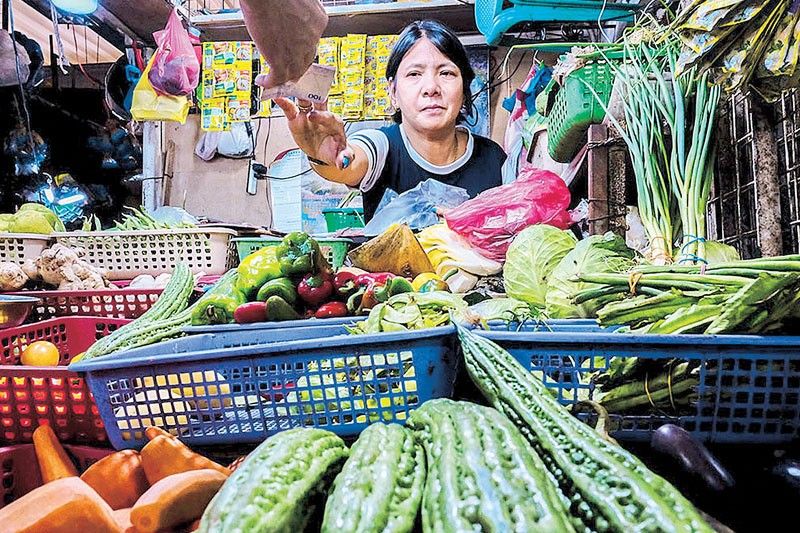Inflation cools to 1.8 percent in March

MANILA, Philippines — Inflation slowed further in March to its lowest level in almost five years due mainly to slower increases in food prices, the Philippine Statistics Authority (PSA) said.
National Statistician Dennis Mapa said at a press conference yesterday that headline or overall inflation cooled further to 1.8 percent in March from the previous month’s 2.1 percent and the 3.7 percent print in March 2024.
The rate of increase in average prices of goods and services consumed by a typical Filipino family last month was the slowest since the 1.6 percent booked in May 2020.
The figure was also within the 1.7 to 2.5 percent forecast of the Bangko Sentral ng Pilipinas (BSP) for March.
Mapa said the downtrend in inflation was primarily due to the slower annual increment in food and non-alcoholic beverages at 2.2 percent in March from the previous month’s 2.6 percent.
Food inflation eased to 2.3 percent in March from 2.6 percent in February due primarily to rice.
The PSA noted that the further deceleration in rice inflation and slower meat inflation contributed to the downward trend in food inflation.
The country’s rice inflation decelerated to 7.7 percent, meaning rice prices last month declined on an annual basis. The latest rice inflation print is the lowest in 60 months or since the 8.4 percent deceleration recorded in March 2020, based on PSA data.
Meanwhile, meat inflation slowed to 8.2 percent in March from 8.8 percent in February, according to the PSA.
Also driving the downtrend in overall inflation in March was the transport commodity group, which declined at a faster pace of 1.1 percent from the 0.2 percent drop in February.
Restaurants and accommodation services also posted slower inflation of 2.3 percent in March from 2.8 percent in the previous month.
Inflation from January to March averaged 2.2 percent, within the government’s two to four percent target.
National Economic and Development Authority Secretary Arsenio Balisacan said that the continued decline in inflation shows that the government’s measures to stabilize prices are working.
“While the inflation rate continues to ease and remain within the target range, we commit to monitoring risks and shocks, particularly on anticipated electricity rate hikes and higher prices of fish and meat, and addressing them through timely and targeted interventions,” he said.
As US President Donald Trump imposed reciprocal tariffs on trade partners, including the Philippines, Balisacan said the government would be vigilant on the potential impacts.
“With or without the trade policy changes in the US, maintaining sound macroeconomic fundamentals, improving the ease of doing business, maximizing existing trade agreements, and forging new partnerships are still the most important strategies we can pursue to ensure that we protect the purchasing power of Filipinos and promote rapid, sustained and inclusive growth,” Balisacan said.
According to Mapa, it is too early to tell the impact on inflation of the 17 percent reciprocal tariff imposed by the US on goods coming from the Philippines.
“But we’re tracking. We will see if there will be spikes in prices of specific commodities,” Mapa said.
Data showed that the US accounted for around $12.14 billion or 17 percent of total Philippine exports of goods in 2024.
Asked for an outlook on inflation for the coming months, Moody’s Analytics economist Sarah Tan said in an email that inflation “should bump around the lower bound of BSP’s target range in the coming months.”
Tan said much of that would be due to a stabilization in food price growth, amid high base effect as the El Niño weather phenomenon took a toll on crop yields last year.
“Further, lower tariff on rice will help ease price pressures from last year,” Tan added.
House Speaker Martin Romualdez said the continued drop in inflation is an indication that the measures implemented by the Marcos administration are paying off.
“This is a welcome development. As I have been saying, this shows that the intervention taken by President Marcos and his administration like the drastic reduction in tariff on rice and setting of maximum retail prices for rice and other food items are paying off,” Romualdez said in a statement.
For his part, Albay Rep. Joey Salceda said the government should continue to keep an eye on the prices of meat.
“As expected, inflation continues to slow down as the price pressures present last year on rice and other key commodities are no longer heated. Year-on-year, the price of rice notably declined by 7.7 percent, a welcome development that was anticipated by the House Murang Pagkain Supercommittee,” Salceda said.
“That said, we must remain vigilant about the prices of meat, which is in larger part determined by the price of corn. While corn prices declined by 1.6 percent year-on-year, meat prices increased by 8.2 percent,” Salceda said.
He added that fish prices are also relatively high. — Jose Rodel Clapano
- Latest
- Trending




























